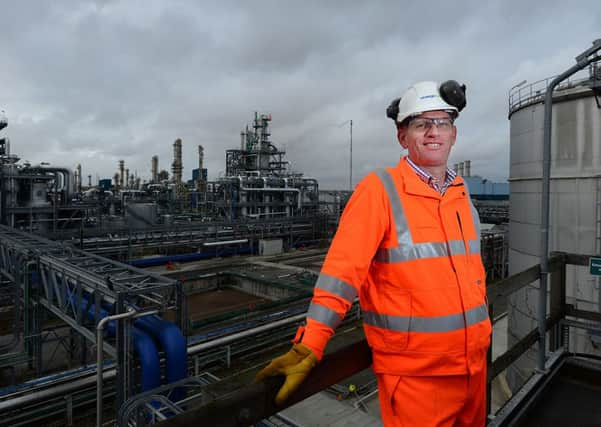Biofuels boss with sights set on delivering firm’s ‘full potential’


“We’ll take a walk round and I’ll show you what £350m can buy,” says Mark Chesworth, reaching for an orange boiler suit.
As we explore Vivergo Fuels’ headquarters at the Saltend Chemicals Park in Hull, it turns out that this vast sum of money can pay for a shiny new biorefinery on a 25-acre site, capable of producing 420 million litres of bioethanol a year.
Advertisement
Hide AdAdvertisement
Hide AdUnfortunately, it doesn’t pay for the office doorways to be extended - the 6”7’ managing director has to duck through every one we walk through.
As we walk around the plant, the equivalent of 12 football pitches, dressed in protective boiler suits, hard hats, goggles and gloves, Chesworth talks me through the production process.
The site, which opened last year, takes locally grown animal feed wheat, mills it, brews it and then extracts the alcohol. This is the bioethanol that is then added to petrol to produce renewable transport fuel.
The plant is big enough to support a third of the UK’s bioethanol demand for petrol.
Advertisement
Hide AdAdvertisement
Hide AdThe protein and fibre left over by the process is then turned into animal feed. The firm is expected to produce 500,000 tonnes a year - sufficient to feed around 20 per cent of the UK’s dairy herd - when it reaches full capacity by the end of this year.
Chesworth, 43, took over at the helm of Vivergo, which was set up in 2007, last December.
During 2013, Vivergo made a loss after taxation of £48.9m on a £51.8m turnover. The company said this was the result of a number of design and commissioning issues at the biorefinery, which led to lower than expected output volumes of bioethanol and animal feed.
In addition, the company was involved in a long-running dispute with Redhall Engineering after Vivergo terminated a contract in 2011, saying the mechanical and piping work was significantly behind schedule on the Saltend plant.
Advertisement
Hide AdAdvertisement
Hide AdThe matter was settled earlier this year when Redhall accepted a £2.1m payout following a court battle in which the judge ruled that Vivergo was in “repudiatory” breach of the contract and that the contract was unlawfully terminated.
“I think the general view was that we were slightly disappointed with the court’s ruling, although we took some solace in the fact that Redhall were viewed to be a major cause of the delays,” says Chesworth. “We chalked it up to experience and moved forward.”
Continuous production of bioethanol and animal feed started during the second half of 2013, and Chesworth said that volumes have increased steadily since then. In 2013, Vivergo’s two main shareholders, AB Sugar and BP, injected a total of £40m in funding to the business, on an equal basis.
By the time he joined the company, Chesworth said key operational faults had rectified and production stabilised. “I would describe my first year as the business moving from what I would call a project phase to an operational phase, ramping up production through the course of this year,” he says. “It’s been a challenging year but a fruitful and positive one.”
Advertisement
Hide AdAdvertisement
Hide AdChesworth refuses to be drawn on when Vivergo will start making a profit but is confident that 2014’s figures will look better than those from 2013.
He adds: “Personally I’m very much looking forward to 2015 when we are at full capacity. Next year is very much about delivering on the business’s full potential.”
As well as the biorefinery, the company has an office in Hessle. Vivergo employs about 150 people. This year it has recruited 37 people, two apprentices and three interns. It plans to launch a graduate programme in 2015.
Critics say that the benefits of first generation biofuel, which is made from food crops, are limited because it cannot be produced sustainably on a large scale without threatening food supplies. Chesworth believes that view is ‘fundamentally flawed’. “We are a food and a fuel business,” he adds.
Advertisement
Hide AdAdvertisement
Hide AdThis is Chesworth’s first foray into the renewable energy industry. His career-to-date has primarily been in operations, including stints at Associated British Foods as Ryvita’s supply chain director and operations director for UK Grocery Group. His most recent role was in procurement and managing commodities on the board of Westmill Foods.
“It’s a new industry for me but there are parallels to businesses I’ve worked in before,” he says. “I was attracted to this role because I was looking to move into a managing director’s position. The story that sits behind the business is a really exciting one and being part of something very early in its life is exciting.”
Born in Nottinghamshire, Chesworth grew up in Derbyshire and studied business at Staffordshire University.
His first job was as a factory planner for a Marks and Spencer lingerie manufacturer but he had his sights set on a top role from an early age.
Advertisement
Hide AdAdvertisement
Hide AdHe progressed quickly through the ranks of various clothing companies and also worked abroad in Dubai and Indonesia before returning to the UK where he moved into the food industry, firstly as a supply chain manager for Northern Foods and then at a brewery before taking up the role at Associated British Foods in 2004.
The married father-of-two lives in Hull during the week and returns to his family near Stamford in Lincolnshire at weekends where he is a keen cyclist and also coaches his son’s under 11s rugby team.
He describes himself as ‘ambitious’ and says his vision is to turn Vivergo into a “highly profitable commodity business” with plans to expand the site further and diversify into new areas in the next five years.
“We don’t believe the Vivergo story ends with what we have got today,” he adds.